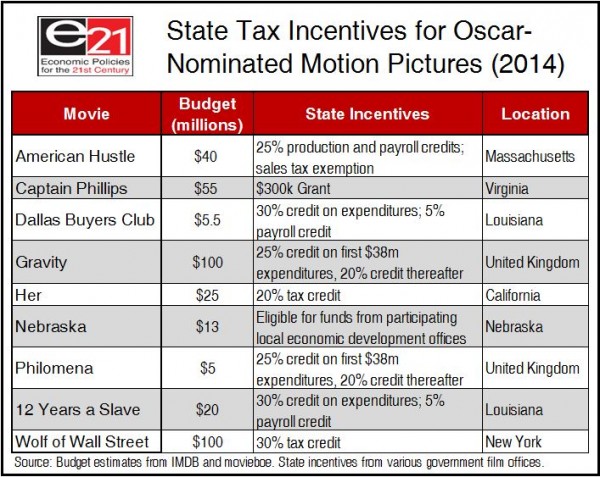Actors and directors may mumble about their art all they like, but Hollywood studios are all about the almighty dollar. But the very capitalist model that makes Hollywood such a wonderful force in the world may lure away California’s signature industry from the very place that gave it the moniker “Hollywood.”
Check out this chart from e21 showing that although the subject of films may be hippie-dippy anti-capitalism, the behavior of those making and marketing films is bare-teethed capitalism itself. Only one film nominated for an Oscar this year, the comparatively small-budget Her, was actually filmed in California.
Read more about Her and its sadly small version of love.
California is no longer the de-facto home of moviemaking.
It’s long been an issue in California that the restrictive and costly labor laws and taxes drive movies and TV away from being shot in California.
It’s sad.
California is my home state. It’s also the place that birthed the industry of movie-making. Plus, it still has all the non-taxation factors going for it: Beautiful light, lots of varied and lovely settings, predictable and cooperative weather, and a huge labor force of skilled and ready industry workers. Let’s not forget those thousands of actors waiting tables, just waiting to be discovered and willing to work for a nothing!
Still, the $100 million budget of Gravity went to the U.K. Another $100 million budget was spent in New York for Wolf of Wall Street.
Read why it’s ok to hate the Wolf of Wall Street, even if it was nominated for an Oscar.
The situation is so bad that the mayor of Hollywood declared a state of emergency after last year’s Oscars ceremony.
“I am starting to see people who have never made a feature film in Los Angeles,” Chris Baugh, location manager for Oscar winner “Argo,” which actually shot in L.A., told the small group outside a soundstage. “In fact, they are afraid to. They are concerned that it is too expensive and too difficult.”
Looks like the state of emergency didn’t work.
There are lots of reasons why industry incentives aren’t the answer for California. Subsidies are generally bad for states and California has so many likely takers that it would be particularly bad for them to offer deep incentives.
Better to reform the entire state budget. For film as for all industry in California, the government has created an atmosphere in which the cost of doing business is prohibitively high. Corporations are moving out, taking their job opportunities with them. Why should the film industry be any different?
California, with its punishment of business in general and its out of control spending, is in a bad way no matter how you look at it. But it is sad it looks like those ultraliberal fiscal policies are costing the Golden State its signature industry.
Hattip to Mark Perry for the link to the chart.














